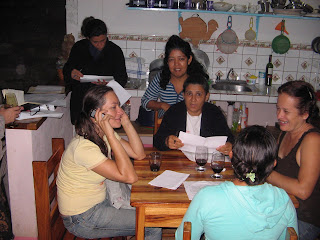
When we arrived in Jalapa on October 8, we were greeted with more pomp and circumstance than we could have expected! Our local board, Pueblos Unidos, came together to throw a magnificent welcome party, complete with traditional Nica music and dancers, and delicious food- enough to feed a small army. We were made to feel very at home and welcome, from the outset.
We spent the past two weeks with Karla, (FCP’s in-country Nica rep), exploring the Jalapa Valley, meeting the communities that FCP works with, getting acquainted with current FCP projects, and discussing needs and ideas with beneficiary communities. Karla updated us on her work for the last 10 months, and we’ve been amazed by all she has done; keeping everything running smoothly, and initiating new connections and projects! She participated in a nutrition workshop this week, as part of her ongoing collaboration with FEDICAMP (another local development organization), on top of all her work with us.
The Huertos (family gardens) project is currently in pause because of the rainy season. The heavy rains wash away newly-planted seeds and bring plague to mature plants, so people are waiting until mid November to plant again, when the rain subsides.
On Monday, we met with the Guitar Cooperative and discussed thoughts on a fair-trade market for their (beautiful, AMAZING) hand-made guitars. We also met with the leader of a dance troupe that provides free dance classes for Jalapeno youth. It is really exciting to learn about the great things happening in Jalapa, and start thinking of ways that FCP can support them. We are looking forward to getting things moving, after this introductory phase.
This week ISLA (Interfaith Service to Latin America) arrived with a brigade from Minnesota. Cervical cancer is rampant in the Jalapa Valley because for many years, women didn’t receive regular pap-smears, and when they did, necessary follow up was limited. There is a high incidence of HPV (Human Papiloma Virus, which can lead to pre-cancer) here, and many cases that could be mitigated become cancer. To help with this problem, ISLA gives free pap-smears and follow-up treatment to Jalapeña women.
Karla and FCP work with the local women’s foundation (Fundación de Mujeres Jalapeñas- FMJ) to support these brigades by ensuring that women arrive for their appointments, and by delivering the results when they come in. FMJ also provides education and outreach to underscore the importance the entire process.
FMJ is a volunteer group of women who came together when the previous system proved inadequate in addressing women’s health issues and providing ISLA support during these invaluable visits. FMJ also works with the Ministry of health toward accountability and effectiveness in the gynecological sector. FCP’s former representative, Tamara Cyzyzk, helped with the formation of the foundation and FCP continues to provide some funding and general support for their work.
This work is long and difficult for many reasons. Many of the women who come for pap-smears and treatment live far from Jalapa and are nearly impossible to contact as they don’t have phones or specific addresses. FMJ must go directly to the communities and ask for the women by name, to ensure that they come for their appointments when ISLA is in town. There is still a lot of stigma and shame surrounding women’s health issues, and FMJ has been working for the last year to educate women about the dangers of cervical cancer and put them more at ease with prevention and treatment processes. The foundation provides counseling for women when their results are abnormal and assistance if they need immediate care, arranging for them to get the treatment they need in a supportive and nurturing environment.
It’s been inspiring to work with this group and to see the progress they’ve made. We were continually impressed by everything they’ve done and by their collaboration with ISLA to make their own work more effective.
One day, as Hannah and Karla worked with ISLA at the hospital, Dan went with the rest of the brigade (ISLA runs two other projects in Jalapa, aside from the women’s health program- more info at: http://isla.cc/index.html) to a coffee plantation (finca) in the mountains. They hiked through a virgin forest with giant Oak trees bearing giant acorns. These trees shade the coffee plants on the steep hillsides. There is an international movement to promote this type of coffee production, called “Café de Pajaros,” or Coffee of the Birds, because it is less intrusive to the environment, and preserves habitat for a milieu of rare and beautiful birds. Four varieties of Tucan live in the hills in and around the finca that Dan and ISLA visited. The owners of this finca wish to develop a sustainable eco-tourism base here, and with Dan’s trail building experience, he found this possibility particularly interesting.
Hasta Pronto, Da Repzzz.


